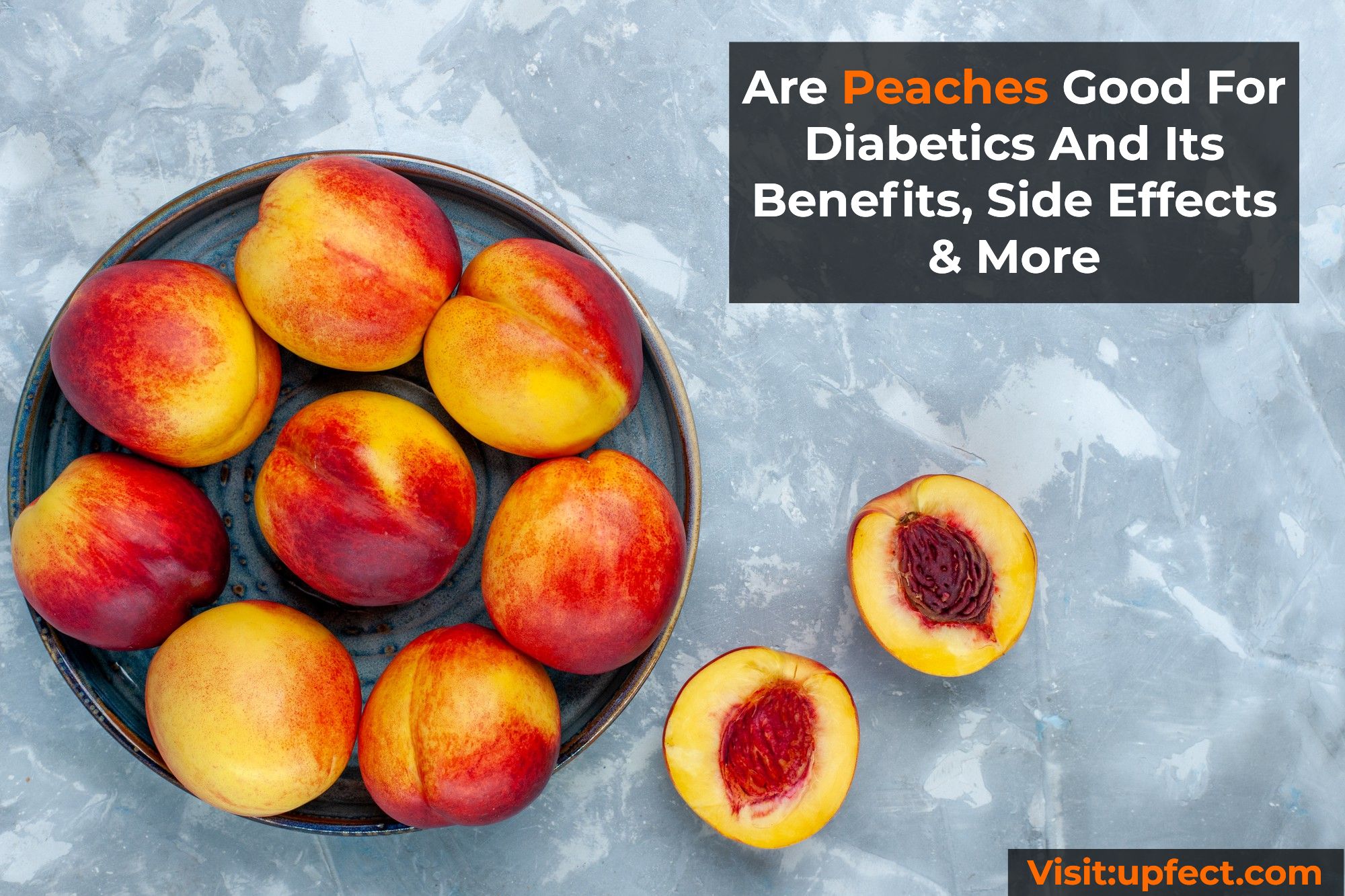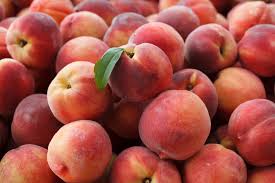
Peaches Good fruit
Peach fruit is a type of stone fruit that develops from a single ovary that is usually round and has fuzzy skin on the outside. They have sweet, juicy flesh inside and a large seed in the center. Its scientific name is Prunus persica. A lot of care needs to be taken during and after planting this tree. This tree cannot be grafted. So it is born from the seeds inside the fruit. The peach probably originated in China. But now peaches are widely grown in many countries around the world, including the United States, Italy, China, and South Africa.
Peaches are a summer fruit, but some varieties of peaches can be found year-round in some regions. There are several types of peaches, including freestone and clingstone peaches. These include freestone peaches that are large and firm, with flesh that is easily separated from the seed. On the other hand, the flesh of the clingstone peach that adheres to the stone is also called a pit. Different types of peaches, each with its own distinct flavor and texture.
Peaches are a rich source of carbohydrates, fiber, and sugars, protein. Peaches also provide iron, choline, calcium, potassium, magnesium, phosphorus, manganese, zinc, vitamin A, vitamin C, vitamin K, etc. Peach contains several phytochemicals, including phenolic acids and carotenoids. Peaches have many health benefits, including boosting immunity, reducing the risk of certain diseases, and improving digestion, making them good for diabetics.
How to eat a peach

Peaches are commonly eaten fresh, but they are also used in cooking and baking. They can be sliced and added to salads, juiced, grilled, and used as a sweet and savory side dish or to make jams, jellies, and sauces. Peaches can also be used in baking, such as in pies, cobblers, and muffins. Fresh or frozen peaches can be blended into a creamy smoothie. For a healthy dessert, use peaches with berries and a bit of dark chocolate.
Peaches nutrition
- Water: 88.9 g
- Calories: 39 kcal
- Carbohydrates: 9.54 g
- Protein: 0.91 g
- Fat: 0.25 g
- Dietary Fiber: 1.5 g
- Sugar: 8.39 g
More sources of cinnamon:
- Calcium: 6 mg
- Iron: 0.25 mg
- Magnesium: 9 mg
- Phosphorus: 20 mg
- Potassium: 190 mg
- Zinc: 0.17 mg
- Fatty acids: 0.019 g
- Niacin: 0.806 mg
- Choline: 6.1 mg
- Vitamin C: 6.6 g
- Vitamin B6: 0.025 g
Are peaches good for you?

Nutrients in peaches, such as vitamin C, potassium and antioxidants, can help support the body’s overall health and potentially improve its ability to cope with stress, which has been linked to better mental health and lower rates of anxiety and depression. In addition, peaches contain magnesium among several minerals, which can make it an ideal fruit for women suffering from anxiety during menopause and improving the quality of their sleep.
People suffering from cough are advised to avoid foods containing histamine, since peaches are low in histamine, so peaches are beneficial for cough. The common cold is a viral infection. Eating a healthy diet that includes a variety of fruits and vegetables, such as peaches, that contains vitamin C, an antioxidant that boosts the immune system to help fight colds and other chronic illnesses.
Peaches are a low-fiber fruit that is easy to digest, which is useful in relieving bloating and other digestive problems. In addition, peaches are rich in water, which helps flush excess salt and water from the body, further reducing bloating. Peaches can be added to the diet as a bodybuilding food. Because they are low in calories, but provide essential nutrients like vitamins A and C, potassium, and fiber. In addition, the natural sugar content of peaches provides energy during a workout.
Peaches are good for dehydrating. Because it is 90% water by weight. Dehydrated peaches make a tasty, healthy snack that is easy to store and transport. They are an excellent source of vitamins, minerals, and fiber, and dehydrating those helps preserve these nutrients.
Are peaches good for diabetics?
Peach is a good source of vitamins, minerals and fiber, making it a beneficial fruit for diabetics. Because peaches have a relatively low glycemic index (GI) value, which measures the effect of carbohydrates on blood sugar levels, meaning peaches are less likely to cause rapid blood spikes. Peaches contain a large amount of bioactive compounds such as quercetin, catechin and cyanidin derivatives, which increase metabolism. Also, peaches are low in fat, making them great for managing diabetes.
“Peaches, plums and nectarines contain bioactive compounds that can potentially fight obesity-related diabetes and cardiovascular disease,” Cisneros-Zevalos said. This study also indicates that the phenolic compounds present in these fruits have anti-obesity, anti-inflammatory and anti-diabetic properties in various cell lines and may also reduce the oxidation of LDL, the bad cholesterol associated with cardiovascular disease.”
peaches good
Peaches can be a healthy food source for women with gestational diabetes, but it is important to consider consumption levels. That’s because peaches contain natural sugars, which can spike blood sugar levels. However, they can be part of a balanced diet for those with gestational diabetes as they are a good source of fiber, vitamins and minerals.
Peaches can be a healthy choice for diabetics for several reasons:
Low-calorie content: Peach is a low-calorie fruit, which helps control weight. And weight control is a great treatment for diabetics. So peaches make it a great fruit for people who are trying to control diabetes.
High fiber content: Peaches are a good source of fiber, which contributes significantly to regulating blood sugar levels and slowing the absorption of carbohydrates.
Antioxidant content: Peaches are rich in antioxidants, including vitamins C and A, which help protect against cellular damage and improve the overall health of diabetics.
Minerals: Peaches are an excellent source of minerals like potassium, magnesium, calcium and phosphorus, which can help maintain healthy blood pressure and blood sugar levels, as well as help diabetics manage diabetes.
Enhanced Nutritional Intake: Peach is an excellent source of antioxidants, vitamins, and minerals, including vitamins C, A, and potassium, which are important for overall health and play an important role in improving the nutrient density of diabetic diets.
Peaches benefits
Rich in antioxidants
Anti-oxidants like lutein, zeaxanthin and beta-cryptoxanthin are there to deal with the toxic elements that come with the intake of oxygen. The compounds play an important role as protective scavengers against free radicals and in promoting healthy aging and reducing various disease processes. Peaches contain significant amounts of phenolics and carotenoids, which contribute to various health benefits as important components.
Fresh and preserved peaches have antioxidant, anti-glycation and anti-inflammatory activity. Fresh peach pulp and peel have demonstrated high antioxidant and anti-inflammatory effects that protect against induced damage.↗️
The tumor growth inhibition and the anti-metastatic effects of peach polyphenolics were investigated. Whereas the results showed that in vivo tumor growth and lung metastasis were inhibited by peach polyphenolics.↗️
Peach is an excellent source of chlorogenic acid which presents a good contribution to antioxidant response and potential, but fruit extracts provide better antioxidant action. Peach may be an important fruit as an important antioxidant source, including chlorogenic acid, and may provide health-promoting benefits to consumers by eating this fruit or using its peel as an antioxidant source in the industry.↗️
Improves heart health
Peaches may reduce risk factors for heart disease. Eating peach fruit keeps high blood pressure and cholesterol levels under control. The fiber in peaches lowers the chances of heart disease. Peach juice strengthens the cardiac muscle and helps in a smooth heartbeat. One study found that high flavonoid intake was associated with a reduced risk of death from cardiovascular disease.
Potassium is an important component of cells and body fluids that helps regulate heart rate and blood pressure and helps maintain a healthy balance in the body’s electrolyte levels, thus regulating our heart rate and protecting against stroke.
Peaches are packed with vitamin C and other antioxidants, which research suggests may help prevent heart disease, stroke and cancer. The fresher and riper they are, the more antioxidants they contain. They are low in fat, high in potassium and free of cholesterol and sodium.↗️
Fruits that contain polyphenols play a role in the prevention of cardiometabolic disorders and cardiovascular disease risk factors. Peach protects against a combination of obesity-induced metabolic disorders including hyperglycemia, insulin and leptin resistance, dyslipidemia, and low-density lipoprotein oxidation.↗️
Reduces the risk of cancer
Peaches are rich in antioxidants that can prevent many chronic problems and cancer. Peach fruit contains carotenoids and phenolic compounds, which play an effective role in preventing tumors and cancer. Also, it slows down the growth of breast cancer and also prevents the spread of these cancer cells. We know that eating fruits rich in vitamin A, such as peaches, can protect against lung and mouth cancer.
Peach is rich in carotenoids and caffeic acid, which may be helpful in preventing some cancers.↗️ Peaches are packed with polyphenols that have been shown to reduce the growth and spread of cancer cells.↗️
This peach fruit helps prevent many types of cancer including lung and colon cancer. The skin and flesh of the fruit are rich in carotenoids and caffeic acid, two types of antioxidants that have anti-cancer properties. Peaches are rich in vitamin C, which helps fight infections and scavenges harmful free radicals that are responsible for causing some cancers.
We evaluated the cell viability and antiproliferative activity of polyphenolic extracts and fractions from selected peach and plum genotypes. Genotypes of the fruit showed cytotoxic effects against breast cancer cells, although not affecting normal cells.↗️
Improves eye health
Peaches are rich in vitamin C. Peach contain antioxidant power that may reduce the risk of age-related vision diseases such as cataracts and dry eyes. Peaches are also rich in lutein and zeaxanthin. The American Academy of Ophthalmology shows that vitamin C is an antioxidant, so it can prevent blurred vision and cataracts.
Numerous studies have shown that lutein and zeaxanthin can provide significant protection against potential damage caused by light injury to this part of the retina. Studies have shown that lutein and zeaxanthin filter high-energy wavelengths of visible light and act as antioxidants to protect against the formation of reactive oxygen species and subsequent free radicals in the eye.↗️
Peach contains vitamin A, vitamin C, and beta-carotene and is one of the healthiest foods that can protect eyesight by increasing blood circulation throughout the body. This fruit is full of bio-chemicals that help strengthen the eyes and cure eye abnormalities. Peach protects the retina from free radical damage, as well as prevents cataracts and macular degeneration (MD).↗️
Vitamin A in peaches also supports healthy eyesight. Although rare, a true deficiency of vitamin A can lead to a condition called xerophthalmia, which can impair normal vision and lead to night blindness (inability to see in darkness or low light).↗️
Improves skin health
Peach is full of natural nutrients and improves skin health. Also protects the skin from dryness and softens it as it also contains alpha hydroxy acids and high levels of vitamins (A, E). The vitamin C in peach is very important for the body because it helps the body produce collagen, which is a protein that helps the body build skin, bones, and teeth. Collagen also plays a significant role in healing wounds and maintaining the youthfulness of the skin.
The presence of beta-carotene and vitamins in peaches fights the signs of aging by improving skin elasticity and premature aging. Various compounds found in peaches can improve the skin’s ability to retain moisture, thus improving skin texture as well. Fresh peaches contain high levels of water, which makes them extremely hydrating, meaning peaches increase your skin’s ability to retain moisture.
The topical application of peach blossom extract has long been used as a traditional remedy in Korea to relieve skin disorders including rashes and eczema.↗️
Eating peaches and using peach blossom extract can significantly contribute to protecting the skin from harmful rays and retaining moisture in the skin.
Helps in healthy digestion
Fiber is important for health, as it helps promote gut health, increasing satiety. Peach fruit is very effective in improving digestion. A medium-sized fruit provides about 2 grams of fiber, half of which is soluble and the other half insoluble. Dietary fiber intake can markedly increase stool frequency in constipated patients. The fiber content also helps remove toxins from the digestive system.
Insoluble fiber balances the digestive system by moving waste through the digestive tract, thereby reducing the chance of constipation. Soluble fiber, on the other hand, forms a gel that improves the body’s digestive process, and moreover, soluble fiber provides food for the beneficial bacteria in the gut, nourishing the intestinal cells.
People have widely cultivated Peach in China, and traditional Chinese medicine has been using its flowers for centuries to treat bowel motility disorders A 2015 study found that peach blossoms may help with motility issues, such as gastroesophageal reflux, and may also improve intestinal contractions, which contribute to the digestive system’s overall ability to push food through the body.↗️
Aids in weight loss
Since peaches are calorie-rich and fat-free with no saturated fat, cholesterol or sodium, they help in weight loss. A peach contains more than 85% water. Peach fruit is one of the best sources of fiber, and fiber helps in weight loss. Peaches have high water content and are full of fiber, so eating peach can help you feel fuller for longer.
According to a report published by the Centers for Disease Control and Prevention, there are some ways to lose weight, one of the ways is to reduce the number of grains and make room for certain fruits like peaches to help you feel fuller and consume fewer calories.
Reduces inflammation
Peaches contain polyphenols and anti-inflammatory antioxidants that can regulate the circulation of inflammatory cytokines and histamine. Vitamin C in peaches has anti-inflammatory properties that can help avoid persistent swellings caused by asthma, rheumatism, gout, and wounds.↗️
Peaches are an excellent source of vitamin C. Apart from its skin-enhancing properties, this antioxidant can play a significant role in fighting cancer-causing free radicals. Vitamins help to relieve chronic inflammation and wound healing in asthma patients. Since the fiber content of peaches helps to remove toxins from the digestive system, it is beneficial in treating health problems like stomach ulcers and inflammation.
Plant-based polyphenols (micronutrients) and prebiotics found in peaches and other plant-based foods can reduce inflammation, which, in turn, can reduce the risk of many chronic diseases, including heart disease, diabetes, cancer, and Alzheimer’s disease.↗️
Increases immunity
Several studies have shown that peaches can be good for boosting our immune system. Because peaches are rich in antioxidants, polyphenols and vitamin C, which are bioactive compounds. These compounds can perform various functions such as protecting cells from damage and slowing aging. Moreover, a study has shown that regular consumption of peaches can reduce the chances of breast cancer.↗️
The vitamin C present in peaches contributes significantly to the body’s resilience by fighting against free radicals. These nutrients help your body heal wounds and keep your immune system strong.
Peach is rich in immunity-boosting nutrients and antioxidants. Test-tube studies report that peach can combat certain types of bacteria.↗️
Useful during pregnancy
Peach contributes significantly to the development of a healthy baby. Folic acid contained in peach helps prevent serious birth defects. During pregnancy, related hormones can slow down your bowel movements leading to constipation. Peaches, rich in fiber, can help solve this problem.
Peaches are especially beneficial for pregnant women due to their high vitamin C and folate content. Vitamin C helps the baby’s normal growth and iron absorption. Folate, which is a source of folic acid, benefits both mother and baby in several ways.↗️
Peaches side effects
The pitch does have some side effects. Some possible side effects to be aware of include:
Allergic reactions: Some people experience allergic reactions to peaches such as itching, hives, swelling of the mouth, lips, tongue, or throat, and difficulty breathing.
Digestive problems: Consuming too many peaches can lead to digestive problems like gas, bloating, and diarrhea.
Drug Interactions: Peach contains a natural substance called salicylate, which can interact with certain medications, including blood thinners and non-steroidal anti-inflammatory drugs (NSAIDs), causing overall health problems.


